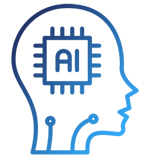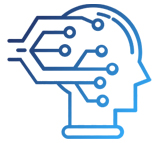- AI

Artificial Intelligence

Smart Products & Services
We follow Smart Products & Services

Intelligent Business Functions & Processes
We follow Intelligent Business Functions & Processes

Robotic Process Automation
We follow Robotic Process Automation

Personalized
healthcareWe follow Personalized healthcare

Identifying at-risk patients
We follow Identifying at-risk patients

Optimized routing and scheduling
We follow Optimized routing and scheduling
- ML

Machine Learning

Predictive
AnalyticsWe follow Predictive Analytics

Service Personalization
We follow Service Personalization

NLP
We follow NLP (Natural Language Processing)

Stock Market Forecasting
We follow Stock Market Forecasting

Fraud Prevention
We follow Fraud Prevention

Recommender engines
We follow Recommender engines
- blockchain

Blockchain

Public Blockchain
We follow Public Blockchain

Private Blockchain
We follow Private Blockchain

DEFI
We follow DEFI Blockchain

Initial stake pool offering development
We follow initial stake pool offering development
- IOT

Internet of Things
- AR
- Business Solutions

Business Solution

Business Performance Management
We follow Business Performance Management

Decision Making & Big Data Analytics
We follow Decision Making & Big Data Analytics

Enterprise Data Management
We follow Enterprise Data Management
- Apps

Apps

Native Apps
We follow Native Apps

Cross Platform Apps
We follow Cross Platform Apps

Web Apps
We follow Web Apps

Hybrid Apps
We follow Hybrid Apps

Cloud Native Apps
We follow Cloud Native Apps
- Lab

Mastering MEAN Stack Development Challenges and Unleashing Potential
The globe is rapidly embracing the digital realm, with applications and online platforms becoming essential components of our everyday experiences. Nowadays, a mere tap within an app can have meals arrive at your door, schedule a medical consultation, or even help you choose attire for an evening event.
Consequently, mean stack development companies with professional skills, like those that are specialized in MEAN stack, are in high demand within today’s employment landscape.
However, what is the MEAN stack, and what are the reasons for acquiring proficiency in it? This article acts as a brief manual to introduce you to MEAN. It explains its importance in learning and guides you on how to master it.
What Exactly Is The MEAN Stack?

The MEAN stack constitutes a relatively fresh and widely embraced comprehensive software package. It leverages JavaScript-oriented technologies and is harnessed for the construction of web applications.
Another way to put it is the MEAN stack represents a JavaScript-centric amalgamation of tools for both the front-end and back-end. It is also tailored for efficient development of comprehensive web applications.
This user-friendly stack is primarily employed for the crafting of interactive and swiftly responsive websites. It stands as one of the most favored stacks due to its user-friendly nature, providing developers with a streamlined and expedited approach to constructing dynamic prototypes for a range of web applications.
This Technology Stack Incorporates Four Distinct Technologies
- MongoDB: A schema-free NoSQL database platform.
- Express JS: A JavaScript framework used for creating web applications within Node.
- AngularJS: A JavaScript framework developed by Google.
- Node.js: An execution environment for server-side JavaScript.
Primarily, MongoDB, Express JS, and Node.js serve as backend development frameworks, while AngularJS is employed for frontend development and modification.
As a result, these components collaborate to facilitate the transfer of data from the backend to the frontend or from the server to the client. You can delve deeper into this subject in our comprehensive MERN stack guide.
It’s also essential to avoid confusion with the similarly named MERN stack. While both stacks share many of the same technologies, the MERN stack developers employ the React JavaScript library instead of Angular.
What Are The Applications Of The MEAN Stack?

The MEAN stack constitutes a collection of software tools and development resources designed to expedite and simplify web development. Web developers utilize this stack to generate dynamic and more sustainable web applications.
For instance, The Weather Channel, a prominent weather broadcasting network, heavily relies on MEAN stack components for its website and software functionality. AngularJS is utilized for weather reports, enhancing functionality, and providing straightforward weather forecasts. This enables the creation of multiple themes based on global predictions, tailored to diverse regions and weather conditions.
Another illustration involves the project management tool Trello, which utilizes Node.js as its foundation. MEAN stack played a crucial role in establishing a system with transparent, rapid, and event-driven forecasts.
Although this stack might not suit every scenario, it excels in various cases. It boasts high flexibility and the capacity to manage numerous connections concurrently, making it an excellent choice for developing MEAN stack applications.
Additional practical applications of the MEAN stack encompass:
- Expense tracking
- Calendar management
- Workflow management tools
- Location search and mapping tools
- Workflow management tools.
Why Should You Acquire Mean Stack Proficiency?

The technology sector is experiencing rapid expansion. For instance, industry experts project that the 1 Machine Learning sector, which was valued at $21.17 billion in 2022, will likely grow to approximately $209.91 billion by 2029. This underscores the opportune timing to enter into these burgeoning domains, including others.
Moreover, delving into the MEAN stack presents an uncomplicated and gratifying entry point. It empowers developers to craft code in a single language for both the front-end and back-end, streamlining the learning and application process.
Here are additional merits and demerits associated with mastering this technology.
Benefits
- Open-source: All constituent technologies are open-source and freely accessible.
- Universal coding feasibility: MEAN stack ranks among the stacks permitting the seamless transfer of code across different frameworks.
- Simplicity and intuitiveness: The stack enables programmers to employ a single language throughout all frameworks, encompassing both backend and frontend aspects.
- Swiftness and efficacy: Given that code is composed in a unified language, its portability accelerates development while Express simplifies routing and management of HTML pages and responses.
- Adaptability, scalability, and expandability: MEAN stack applications are amenable to customization and configuration, catering to the versatility required by most web applications.
- Cost-effectiveness: With its reliance on a unified language, the need for an extensive team of experts for application development and testing is minimized. Furthermore, the transferability of code between frameworks enhances efficiency.
Drawbacks

- Specific generalized JavaScript coding guidelines: Despite the abundance of MEAN stack resources and courses, comprehensive guidelines or standardized JavaScript coding practices for this technology are lacking.
- Inadequate separation of server isolation from business logic: The rapid pace of project management can lead to insufficient separation between server and client functionalities, potentially leading to improper software practices.
MEAN Stack Frequently Asked Questions

Having gained an understanding of this technology stack and its value, let’s succinctly address several commonly posed inquiries concerning it.
What programming language is utilized within the MEAN stack?
JavaScript serves as the foundational language for all components of the MEAN stack. This language spans all layers of the stack, including MongoDB, Express, Angular, and Node.
JavaScript is employed for both backend/server and frontend/client aspects, ensuring the web application’s speed, dependability, and security.
Is learning the MEAN stack a challenging endeavor?
Typically, no. The MEAN stack is an open-source framework for web application development, rooted in JavaScript. This inherent connection to JavaScript renders it remarkably intuitive, adaptable, and easy to comprehend and manage.
As a result, it is relatively straightforward to learn and apply, especially if you already possess expertise as a full-stack web developer.
Note: For those embarking on their coding journey, it’s recommended to initially focus on learning vanilla (fundamental) JavaScript. Understanding the core of the language will establish a sturdy foundation for future learning.
Why has the MEAN stack gained substantial popularity?
The MEAN stack’s popularity is attributable to its remarkable flexibility, scalability, and expandability, positioning it as an optimal solution for crafting cloud-native applications. Furthermore, its open-source nature, efficiency, and manageability contribute to its reputation as one of the most cost-efficient technology stacks available. Consequently, the MEAN stack garners extensive recognition and adoption among developers and small business owners globally.
What is the typical salary for a MEAN stack developer?
In the United States, the annual remuneration for a MEAN stack developer ranges from $75,000 to $120,000. According to Glassdoor, the average yearly salary amounts to $80,430, derived from an aggregation of salary data.
Additional compensation, including bonuses, tips, and commissions, typically adds an extra average of $12,688 per year.
Is there a demand for MEAN stack expertise?
Certainly. Proficient MEAN stack developers are in high demand and hold a strong market presence.
With a solid grounding in JavaScript and other advanced programming languages and applications, you can become a valuable and proficient MEAN stack programmer, consistently sought after by employers.
How to Acquire MEAN Stack Proficiency
Previously, becoming a MEAN stack developer required enrollment in coding schools to acquire specialized training in full-stack development.
However, this landscape has evolved. Thanks to technological advancements and modern best practices, learning the MEAN stack has become more accessible.
The following proficiencies are key to mastering the MEAN stack:
- Cascading Style Sheets (CSS)
- HTML
- Familiarity with web servers like Nginx or Apache
- Scripting in Java
- Proficiency in languages such as Ruby, PHP, or Python
- Implementation of Operating Systems like FreeBSD, Linux, or CentOS
- Database management systems knowledge, such as Oracle or MySQL
- Proficiency with version control systems, such as Git
Primary Hurdles in MEAN Stack Development in 2023
Most enterprises seek MEAN stack development services for their agility, precision, and rapid creation of web applications. However, several obstacles could impede your engagement with a MEAN stack. These challenges are outlined below:
-
Interconnectivity
The MEAN stack relies on interconnected applications, presenting a challenge wherein a single malfunction can disrupt overall connectivity. Such situations might result in data corruption. For instance, JavaScript “scoping” concerns can influence where code is executed. To mitigate this, your developers must refrain from operating within overlapping code areas.
-
Performance
In contrast to native OS applications constructed using C++ or Java, MEAN stack technology can exhibit occasional sluggishness. Therefore, it’s prudent to establish pragmatic expectations regarding your application’s runtime before enlisting a JavaScript developer.
-
Glitches and Flaws
The MEAN stack encompasses diverse technologies like MongoDB, ExpressJS, AngularJs, and NodeJs. As with any frameworks and tools, they undergo regular updates. However, these updates might introduce bugs and glitches that impact your application’s functionality. Hence, it’s essential to ensure that your prospective programmers remain well-versed in the latest updates to adeptly identify and rectify issues. It is recommended to exclusively engage proficient and seasoned MEAN experts who can adeptly and professionally manage bugs and flaws, enhancing your application’s performance.
-
Legacy Code
Previous methods of code composition are no longer suitable for modern mobile or web app development. Yet, this presents another challenge when recruiting seasoned developers. The optimal strategy here is for developers to enhance their skills, enabling the crafting of secure, stable, and aesthetically pleasing web applications.
-
Crux
Whether you employ the MEAN stack or alternative technologies, challenges and hurdles are inevitable. The most effective approach is to engage a skilled MEAN stack developer. Armed with years of experience, they are well-equipped to navigate challenges and obstacles seamlessly, culminating in the creation of dynamic web applications.
Conclusion
As observed, the MEAN stack enjoys considerable popularity, and this trend appears to be in it for the long run.
In fact, it would not be wrong to claim that it will hold a vital role in the technological landscape of tomorrow. As such, embracing the role of a MEAN stack developer can yield substantial rewards both in the present and the future.
Numerous comprehensive web development and software engineering courses, such as the Full-Stack Developer Program, incorporate the MEAN stack as a pivotal component within their educational frameworks. Furthermore, if you are looking for an IT services company, get in touch with Sky Potential.

















































Leave a Reply